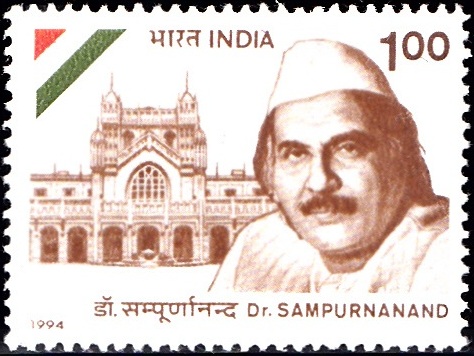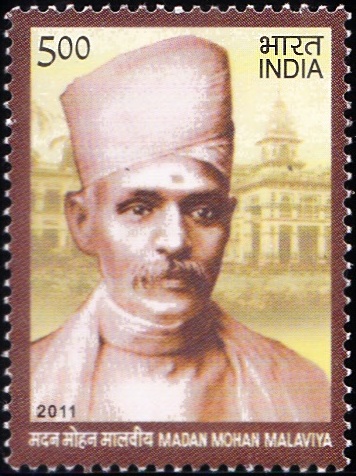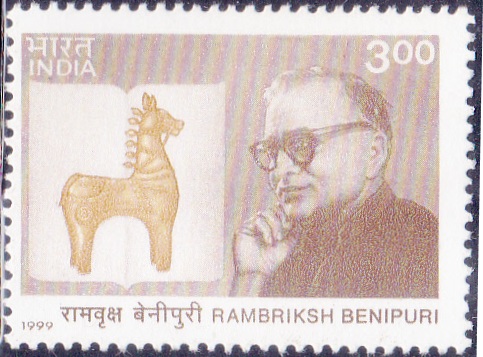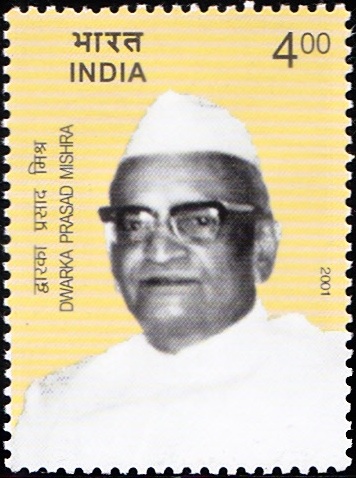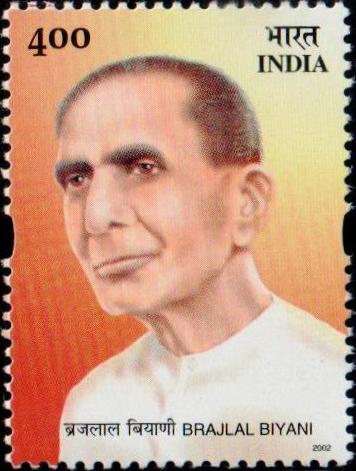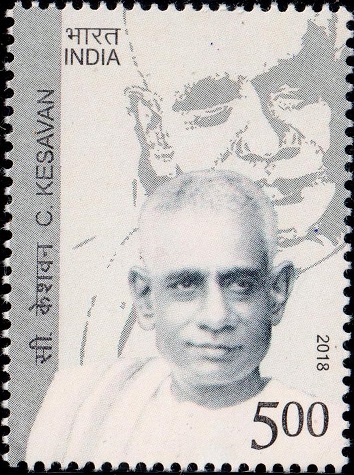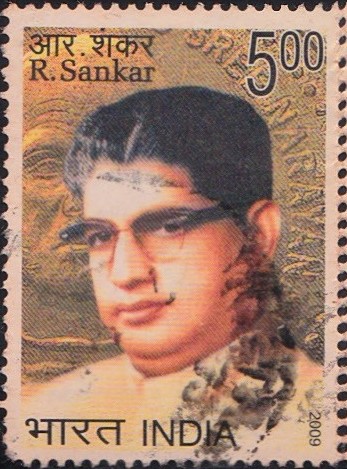
R. Sankar
A commemorative postage stamp on the Birth Centenary of R. Shankar, 3rd Chief Minister of Kerala (1962-64) :

 Issued by India
Issued by India
Issued on Apr 30, 2009
Issued for : India Post is proud to issue a commemorative postage stamp on R. Sankar.
Credits :
Stamp & FDC : Suresh Kumar
Cancellation : Alka Sharma
Type : Stamp, Postal Used
Colour : Multi colour
Denomination : 500 Paise
Stamps Printed : 0.4 Million
Printing Process : Wet–offset
Printer : Security Printing Press, Hyderabad
Name : R. Sankar
Born on Apr 30, 1909 at Kuzhikalidavaka, Puthoor, Travancore, British India
Died on Nov 6, 1972
About :
- R. Sankar was a freedom fighter, educationist, lawyer, journalist, administrator, social reformer and a political leader.
- A multi-faceted personality, R. Sankar brought to bear his immense organisational skills on making an indelible impact on many spheres of activity throughout his relatively brief but glorious life. His political and administrative contributions to the country, as a Member of the Constituent Assembly, as a leader of the Congress Party and as the Chief Minister of the State of Kerala, were of lasting significance, as also his pioneering role as an inspirational social reformer. However, perhaps his most enduring image in the annals of Kerala is that of a legendary and visionary educationist who founded numerous educational institutions in the uncompromising pursuit of academic excellence.
- Sankar was born on April 30, 1909 to Raman and Kunchali Amma at Puthoor village near Kottarakara in Kollam district. Although he grew up in a lower middle class environment fraught with financial and social constraints, he was fortunate enough to obtain good education in his formative years. His formal education began in Puthoor primary school and later continued in an English school in Kottarakara.
- In 1924, he joined Maharaja’s College (the present University College), Thiruvananthapuram, with the help of a benevolent relative, as his father could not afford the expanses for his higher education. Soon after taking his B.A. degree in 1928, he was appointed head master in Sivagiri school, which had been founded by the renowned saint and social reformer Sree Narayana Guru himself.
- Sankar was keen to travel to England for further studies in chemistry, but since he did not have the means to do so, he opted for a career in law by joining the Law College at Thiruvananthapuram, taking a degree, and starting practice as an advocate at the district court at Kollam in 1936. He made a promising start in the legal profession, but was soon drawn into the political agitation of Travancore launched by the State Congress Party. He was arrested for defying a ban and addressing a public meeting at Kollam in August 1938 and was sentenced to 18 months of imprisonment and a fine of Rs. 2000. He was arrested several times thereafter and spent a total period of three years in prison.
- Sankar served as secretary of the State Congress for four years, until he was elected general secretary of the Sree Narayana Dharma Paripalana (S.N.D.P.) Yogam on December 20, 1944. The S.N.D.P. Yogam was a prominent social body of Kerala, with a program of constructive work. Sree Narayana was the Renaissance, the Reformation and half the social revolution of Kerala. Inspired by the teachings of Sree Narayana, Sankar rose to the forefront of the social revolution, adopting the strategy of setting up educational institutions to provide education for all.
- Sankar’s most outstanding contribution has been in the field of education in a state where the vast majority of lower caste Hindus could not enter schools and colleges on account of the obnoxious caste system that prevailed in the princely states before independence. Though the social transformation triggered by Sree Narayana Guru’s movement liberated them from the caste stigma, higher education still eluded them. Sankar launched many educational institutions, all of which were named after Sree Narayana. Sree Narayana College founded in 1948 at Kollam became the largest college in the state in terms of student strength and the number of postgraduate courses. Sankar was the first to start in the private sector an exclusive women’s college called the Sree Narayana College for Women in 1951. By 1956, it had become the biggest women’s college in Kerala in terms of student strength.
- When he became Minister for Education, Sankar carried forward the inclusive education movement by facilitating the setting up of several junior colleges in different parts of the State almost all of which were in the private sector, a revolutionary and innovative policy which made higher education accessible to economically poor sections who could not afford to go to major cities where most colleges were located.
- As the secretary of the social organization, S.N.D.P. Yogam, Sankar also established an ‘Educational Fund’ aimed at enabling financially challenged students to continue their education. Such was the zeal and energy of his endeavour that in a single day in 1945, he was able to mobilise public contributions and raise more than Rs. 1,05,000. In 1946 and 1947, he successfully collected large contributions for the primary and secondary educational fund and the general education fund respectively.
- If today Kerala is the most literate State in India with a literacy rate of around 95 per cent, it is because of Sankar‘s far-sighted initiatives. Significantly, the private sector has continued to play major role in the area of education in the State, accounting for over 80 per cent of its higher educational institutions. In the initial years, such institutions were set up mainly by Christian missionaries. Subsequently, other communities entered the field. But it is widely acknowledged that it was R. Sankar‘s dedicated efforts and his visionary emphasis on promoting inclusive education that has undoubtedly contributed to give Kerala its present position stands in terms of educational attainments. According to V.R. Pillai, the well-known educationist of Kerala : “Sankar’s enduring place in the annals of Kerala will be as a distinguished educationist who pursued the path of academic excellence“. Apart from being educationist he made his work in Journalism also. He founded and edited a Malayalam daily called Dinamani. It was during this period that he made a pioneering effort to bring out a ‘Year Book‘ in Malayalam. The Year Book published in 1956 was a great success.
- In 1948 he was elected as Deputy Chief Minister holding the portfolio of Finance. He was the first Finance Minister of Kerala to have consecutively presented five budgets in the State assembly. R. Sankar became Chief Minister in 1962.
- R. Sankar breathed his last on 06.11.1972.
- Text : As per the material provided by the proponent.
Subscribe
Login
0 Comments


